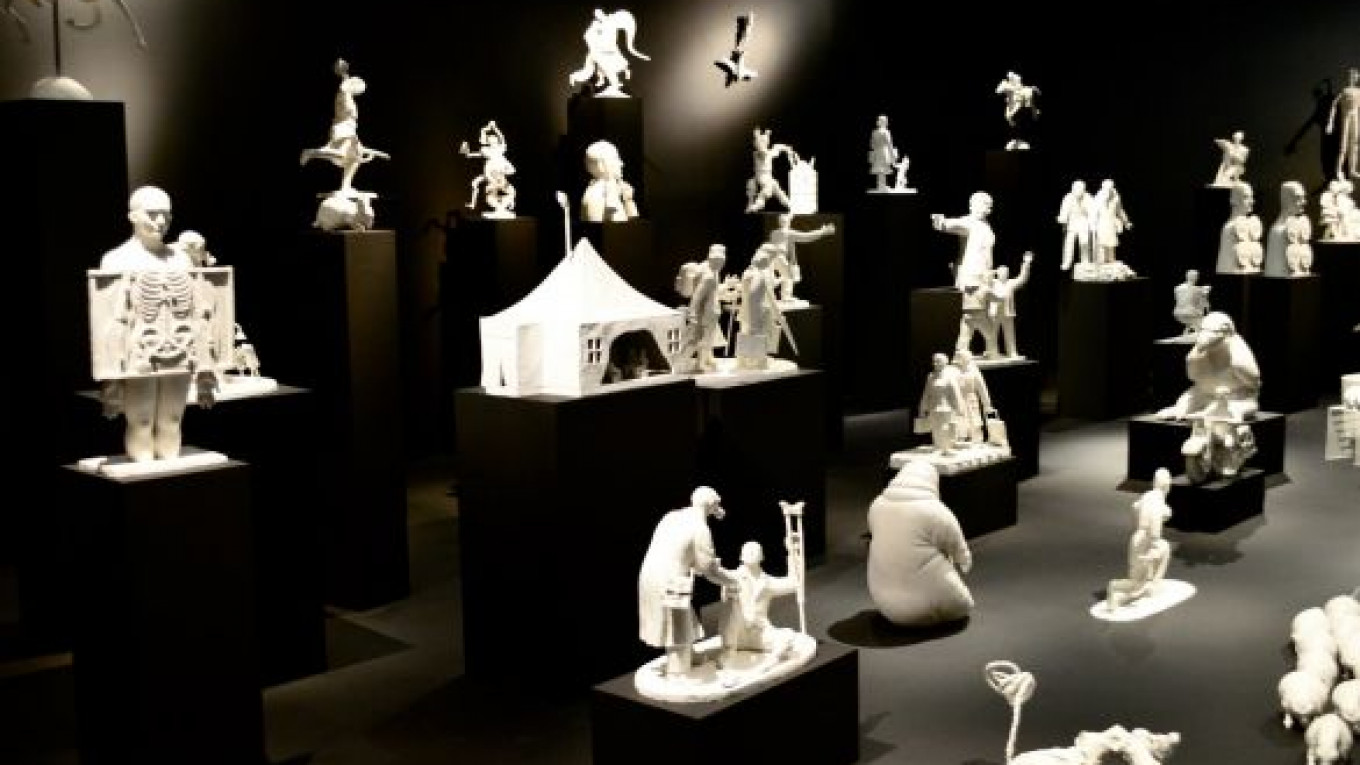An exhibition of the 35 nominees for Russia's most prestigious award for contemporary art, the Kandinsky Prize is now on at the former cinema Udarnik.
The prize, now in its fifth year, saw a record 385 submissions this year. One of the distinctive features of the prize is that artists are able to nominate themselves.
The submissions have been whittled down to 20 nominees for Project of the Year category and to 15 for the Young Artist. Project of the Year category. The winner of the former will receive a prize fund of 40,000 euros, and the latter 10,000 euros.
Last year, the provocative art group Voina was nominated and went on to win a prize for their drawing of a giant phallus on a drawbridge opposite the FSB headquarters in St. Petersburg, but this year's art-punk sensations Pussy Riot, two of whose members are currently in prison for their performance in Russia's chief cathedral, did not make it on to the shortlist.
Nevertheless, the list is not unreflective of the protests that rose up over the last year with Anton Litvin nominated for organizing an artist's protest in May that saw more than a dozen artists set up easels on the embankment opposite the Kremlin and draw it in white on white — the color of the protest movement.
Other nominees include a number of the most famous Russian artists, such as art collective AE+F.
An international jury of experts, including U.K. curator David Thorp and American art historian and Dean of the Yale University School of Art Robert Storr, selected the shortlist.
One of the most exciting features of this year's exhibition is its location in the former Udarnik cinema. Designed by Boris Iofan, the architect whose concept for the Palace of Soviets with a 70-meter statue of Lenin won a famous contest in 1932, the cinema is a unique landmark and part of the infamous House on the Embankment.
Intended for the Soviet elite, the block contained 505 apartments, but up to a third of its residents became victims of Stalin's purges during the Great Terror.
In the 1990s the cinema became a car showroom and later one of the city's biggest casinos. There are now plans to turn the building into a gallery space.
The organizers of the Kandinsky Prize hope the building's eclectic history will add to the visual and aesthetic experience of the exhibition.
"It takes place within an area not yet adapted for a museum showing, an area that contains the temporal layers of previous eras,"said Igor Chirkin, one of the exhibit's designers. "This encourages the presenters to play with time and 'synchronize' the works of art. Each work possesses its own temporality and, as such, interacts with the other works as well as the temporal-spatial context of the movie theater."
It is a unique and engaging opportunity to see the works in this environment. Grisha Bruskin's striking sculptures, nominated for Project of the Year, are impressive in front of the former main cinema screen in a work entitled "H-Hour."
A complex wooden structure, "Universal Mind," by Nikolai Polissky, roughly representing a brain in a box, fills the main lobby, providing a nice contrast between the organic properties of the work and the leftover kitsch of the former casino.
"In the States there is a great deal of concern about museums turning into casinos. Here it is nice to see a casino turned into a museum!" Storr said.
"This is an opportunity to see Russian art in a Russian context, to see art you have never seen before," he said.
The winners of the competition will be announced on December 13.
The exhibit runs till Dec. 16. Udarnik. 2 Ulitsa Serafimovicha, Tel. (495) 225-8700,
Related articles:
A Message from The Moscow Times:
Dear readers,
We are facing unprecedented challenges. Russia's Prosecutor General's Office has designated The Moscow Times as an "undesirable" organization, criminalizing our work and putting our staff at risk of prosecution. This follows our earlier unjust labeling as a "foreign agent."
These actions are direct attempts to silence independent journalism in Russia. The authorities claim our work "discredits the decisions of the Russian leadership." We see things differently: we strive to provide accurate, unbiased reporting on Russia.
We, the journalists of The Moscow Times, refuse to be silenced. But to continue our work, we need your help.
Your support, no matter how small, makes a world of difference. If you can, please support us monthly starting from just $2. It's quick to set up, and every contribution makes a significant impact.
By supporting The Moscow Times, you're defending open, independent journalism in the face of repression. Thank you for standing with us.
Remind me later.






